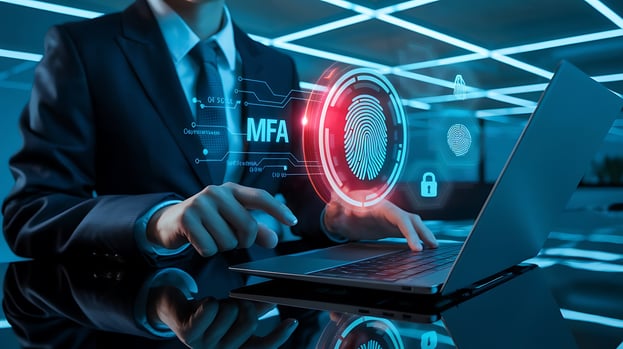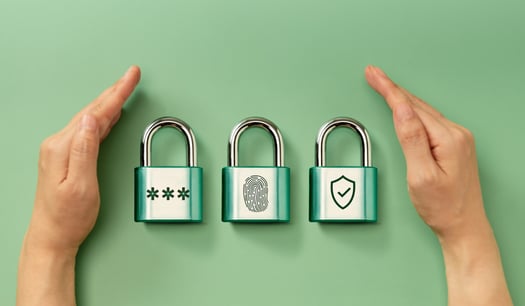
Are you someone that does not want any trace of work on your phone with the intent of separate work from home? Well, you’re not alone.
It’s understandable that you would want to have a personal device that has no affiliation to work or receive any work-related phone calls. However, with threat actors ruthlessly and creatively generating scams for folks to fall victim to, it’s important to understand the benefits of using multi factor authentication across multiple devices.
What’s MFA & Why Is It So Important
If you’re relatively new to terms within the world of cybersecurity, MFA is a short abbreviation for Multi-Factor Authentication. MFAs add another layer of security to your accounts by requiring multiple forms of verification.

These verification types can be but not limited to:
- Password
- Security questions
- Facial recognition
- Fingerprint scans
- SMS or phone call option
While these to take additional extra steps to log into your account, this approach makes it harder for hackers to cause a cybersecurity incident with your information and you safe.
We understand downloading a new software on your device that you may not be familiar with may not be your ideal first choice. However, lets look at it with a different approach.
Downloading MFA to Multiple Devices Will Help:
- Reduce risks of passwords being compromised. If you happen to have weak passwords or repetition of passwords across multiple accounts and no MFA, hackers can easily gain access to your information. MFA adds a critical layer of security to make it more difficult for hackers to attempt to get access. Why? Because if they try to log in, your MFA notifies you and they need that code to get in. If they don’t have the code, they can’t get in.
- Sensitive data is increasingly more secured than before, up to 99.9%.
The way we look at it, MFA is important on work related information, you can also use it for your own personal accounts.
Following Examples: - Bank accounts
- Car insurance information
- Social media accounts
- Online subscriptions
- Retail related accounts
- And many more
- Importantly, it protects businesses. Organizations should require MFA for remote access, specific work accounts, emails and VPNS that hackers will try to target.
2FA and MFA
You’ve heard of MFA, but what about 2FA. What’s the difference?
MFA (Multi Factor Authentication) is a broader category that requires two or more varying types of authentication factors.
2FA (Two-Factor Authentication) is a specific type of MFA that only requires two factors to access your accounts.
While both can be used interchangeably, when using MFA or 2FA, always make sure that each password you create is unique, at least 26 characters long and adding random symbols (!@#$%^&*/.,';[]) of characters to make it harder for hackers to guess.

Why Its Important to Have MFA on Personal Devices Even For Work
The access of your accounts across multiple devices makes work and personal operations run smoothly. However, if you do not download MFA to your phone for self or work, there are some scenarios to be considered.
Scenario 1: Lets say you are on your way to work or even school, then your phone (specifically iPhone) shuts off. Not just a phone shut off from your battery, but your phone’s logic board.
A logic board in your phone is the device’s ‘brain’ that houses the essentials like CPU, memory, storage and connecting hardware in locations as needed. In short, controlling your phones overall functions and operations.
In the case where your logic board for your iPhone fails, majority of the time you are going to have to get a new phone and transfer as much data as you can. Now with MFA, if it is NOT on multiple devices, you will have to redownload MFA, you must contact your IT department’s help desk requesting to clear your first account. All extra steps that need to be taken that could have been prevented if you had MFA on other devices with some work information.
Scenario 2: Let’s say you and your team are traveling internationally for a business trip/convention. You need to access your essentials for work to submit for a deadline that happens to overlap international travel. Since some MFA methods can be SMS messaging or phone calls, they don’t always work when you’re going international/overseas.
In cases like this, you need to make sure your MFA methods also reflect your current plans, especially for traveling, to avoid being locked out or delayed with important documents and the ability to send them over as needed. This is also just as important if you are still in school or have kids that are in college and need to travel during finals.
Scenario 3: Following into scenario 1, let’s say your phone is lost or gets stolen. You no longer have any of your personal information at your fingertips and will probably have to get a new phone. If you don’t have MFA on lets say an Ipad you own, accessing your original MFA is going to be more challenging than if you had it securely on another device.
As much as you think you are being safe, and you don’t make new accounts or place your information publicly, hackers will try anything to get your information. Its just the type of world we live in and have to adapt to keep us safe.
You must be one step ahead of them at all times to protect your documents, information, and also importantly yourself.
Can MFA Be Hacked?
While MFA is very effective in being 1 step ahead from hackers, its not always 100%. With hackers ruthlessness to hack your devices, social engineering tactics can be a don’t-blink-or-you'll-miss-it if you're not careful. One method they likely will attempt is attempt logging in, then flood you with MFA requests. The more they send, the more frustrating it gets. The goal, to isolate and can cause cybersecurity fatigue over repeated actions.
If you happen to find yourself in the scenario where you receive multiple MFA requests and they're not logins you've made:
- Don’t approve the MFAs you're getting notified about.
- Contact the platforms account as soon as possible.
- Change your passwords associated with the accounts impacted
Your data is valuable and MFA increases your accounts' security. This tool adds a layer of secure that stops hackers from gaining access.

Have MFA Concerns? Ekaru Can Help!
Navigating Multi-Factor Authentication (MFA) can be overwhelming, especially when trying to manage an ideal work life balance, and security with user convenience. The Ekaru team is here to simplify and explain the process that is easy to retain!
We work closely with your organization to implement MFA solutions that are tailored to your needs, budget, and ensuring minimal disruption to operations with maximum protection considered.
Rolling out MFA for the first time, onboarding/training new employees or need help troubleshooting issues, managing devices, we provide remote or hands-on support and informative cybersecurity training courses that will help you identify which ways hackers will try to get access to your accounts and how they attack your MFAs.
Cybersecurity isn't just a service we offer; it's a core function of how we protect and empower your business.
With the increasing frequency of cyber threats, having a proactive and responsive MSP partner is critical. Our team combines industry-leading tools with real-world experience to deliver customized, comprehensive protection. Including endpoint security, threat detection, compliance and assisting with disaster recovery.
We don’t just respond to threats; we help you stay ahead of them. When you choose us for your small or medium-sized business, you're not just getting an IT provider, you’re gaining a cybersecurity ally committed to your success.
Interested in learning how we can implement MFA to your business that also fits your budget needs? Let’s Connect!
Reach out to us at www.Ekaru.com or call 978-692-4200 and schedule a time to chat with us today!
.png)